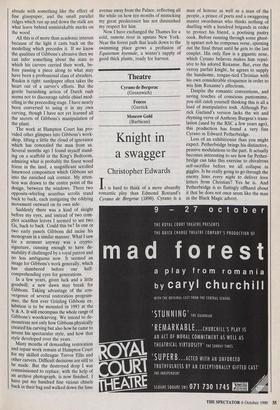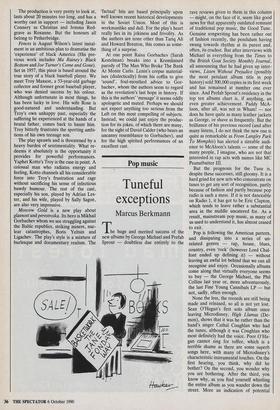Theatre
Cyrano de Bergerac (Greenwich) Fences (Garrick Moscow Gold (Barbican)
Knight in a swagger
Christopher Edwards
It is hard to think of a more absurdly romantic play than Edmond Rostand's Cyrano de Bergerac (1898). Cyrano is a man of honour as well as a man of the people, a prince of poets and a swaggering master swordsman who thinks nothing of duelling with a hundred brigands in order to protect his friend, a poetising pastry cook. Before running through some ghast- ly upstart nob he composes verse, spinning out the final thrust until he gets to the last couplet. His only flaw is a gigantic nose, which Cyrano believes makes him repul- sive to his adored Roxanne. But, ever the verray parfait knight, he agrees to supply the handsome, tongue-tied Christian with his own considerable eloquence in order to win him Roxanne's affections.
Despite the romantic conventions, and saving touches of conscious pantomime, you still catch yourself thinking this is all a load of manipulative tosh. Although Pat- rick Garland's version lacks the wit and rhyming verve of Anthony Burgess's trans- lation (used by the RSC a few years ago), this production has found a very fine Cyrano in Edward Petherbridge.
Less of an exhibitionist than you might expect. Petherbridge brings his distinctive, pensive modulations to the part. It actually becomes interesting to see how far Pether- bridge can take this exercise to chivalrous self-sacrifice before we all collapse in giggles. Is he really going to go through the enemy lines every night to deliver love letters from Christian? Yes he is. And Petherbridge is so flutingly offhand about it that he does not once seem like the man in the Black Magic advert. The production is very pretty to look at, lasts about 20 minutes too long, and has a worthy cast in support — including Jason Connery as Christian and Jemma Red- grave as Roxanne. But the honours all belong to Petherbridge.
Fences is August Wilson's latest instal- ment in an ambitious plan to dramatise the 'experience' of black America (His pre- vious work includes Ma Rainey's Black Bottom and Joe Turner's Come and Gone). Set in 1957, this piece is based around the true story of a black baseball player. We meet Troy Maxson, a 53-year-old garbage collector and former great baseball player, who was denied success by his colour. Although unfortunate in most things, he has been lucky in love. His wife Rose is good-natured and understanding. But Troy's own unhappy past, especially the suffering he experienced at the hands of a brutal father, comes back to haunt him. Troy bitterly frustrates the sporting ambi- tions of his own teenage son.
The play sprawls and is threatened by a heavy burden of sentimentality. What re- deems it absolutely is the opportunity it provides for powerful performances. Yaphet Kotto's Troy is the case in point. A colossal man who radiates energy and feeling, Kotto channels all his considerable force into Troy's frustration and rage without sacrificing his sense of infectious bawdy humour. The rest of the cast, especially his son, played by Adrian Les- ter, and his wife, played by Sally Sagoe, are also very impressive.
Moscow Gold is a new play about glasnost and perestroika. Its hero is Mikhail Gorbachev whom we see struggling against the Baltic republics, striking miners, nuc- lear catastrophes, Boris Yeltsin and Ligachev. The play's style is a mixture of burlesque and documentary realism. The 'factual' bits are based principally upon well known recent historical developments in the Soviet Union. Most of this is workmanlike and dull. For the play's heart really lies in its jokiness and frivolity. As the authors are none other than Tariq Ali and Howard Brenton, this comes as some- thing of a surprise.
At one point Raisa Gorbachev (Sarah Kestelman) breaks into a Kremlinised parody of The Man Who Broke The Bank At Monte Carlo. Lenin's corpse material- ises (dialectically) from his coffin to give 'sound', foul-mouthed advice to Gor- bachev, whom the authors seem to regard as the revolution's last hope in history. If this is the authors' message' it seems oddly apologetic and muted. Perhaps we should not expect anything too serious from the Left on this most compelling of subjects. Instead, we could just enjoy the produc- tion for its jokes, of which there are many, for the sight of David Calder (who bears an uncanny resemblance to Gorbachev), and for the high spirited performances of an excellent cast.



















































 Previous page
Previous page